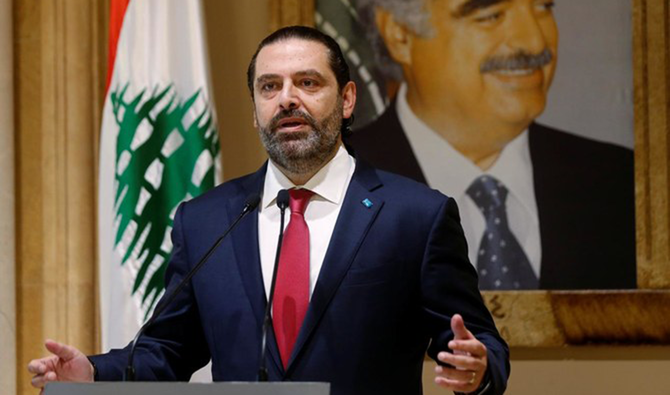
- ARAB NEWS
- 03 Jul 2025

Najia Houssari
BEIRUT: Saad Hariri could lead Lebanon’s government again amid proposals to bring him back, almost a year after he resigned as prime minister in response to mass protests about the country’s dire economic and financial situation.
Mustapha Adib quit as prime minister-designate a week ago after failing to form a government of specialists independent from the parties in power.
Lebanon desperately needs an international bailout and France, in particular, is urging politicians to begin much-needed reforms to deal with the grave problems facing the country.
Last week French President Emmanuel Macron gave leaders more time to form a government of specialists as part of an initiative to rescue the country.
But key players are overriding some of the conditions set, notably Hezbollah and the Amal Movement who insist on keeping the finance portfolio and naming the Shiite ministers in the government.
Two opinions prevail in Lebanon. One is that the government will not be formed before the US presidential elections in November. The other is that President Michel Aoun will soon set a date for parliamentary consultations, and the possibility of facilitating Hariri’s return to head the government is being proposed based on positive signs.
Mustafa Alloush, a leading figure in the Future Movement, said that Hariri was committed to the French initiative and that his convictions remained changed. “The movement that is taking place and the proposals have not reached a result,” Alloush told Arab News. “An independent government is required for Hariri to head it.”
In terms of Aoun setting a date for parliamentary consultations, Alloush said that the president would undergo a 14-day quarantine in light of a coronavirus case among those close to Baabda Palace and that the US elections would be approaching by then.
Regarding an initiative from former Prime Minister Najib Mikati to form a techno-political government headed by Hariri, Alloush said: “This is one of the ideas discussed, but Hariri stipulated in his response the implementation of the French initiative.”
MP Nicolas Nahas, who is from the Mikati parliamentary bloc, said: “Lebanon missed a golden opportunity by wasting the French initiative for illogical reasons in light of the accumulated crises we are suffering from.”
He added that Lebanon was in the middle of a complete collapse and what was required was to form a government as soon as possible, including politicians and specialists. “Prime Minister Mikati’s proposal aimed to help solve the problem of the government issue after it became clear that separating politics from the economy is difficult and led to the failure of the former Prime Minister-designate Mustapha Adib’s mission.”
The lack of progress led to clergy renewing their criticism of politicians.
On Sunday the Maronite Patriarch Bechara Al-Rai said: “The enormity of the situation and the possibility of developments of a diverse nature necessitates the acceleration of the formation of a government that embodies the aspirations of the citizens, to organize the constitutional and charter work, so that no one allows himself to exploit the state of constitutional coma, the presence of a caretaker government, the coronavirus pandemic, or what is worse than that, to create a fait accompli.”
He also warned of a possible brain-drain, saying that Lebanese youth had a tendency to leave the country in search of “work, security and a decent life.”
The Metropolitan of Beirut and its Territory for the Greek Orthodox Church Archbishop Elias Odeh used his Sunday sermon to attack “the lack of mercy” among the country’s leaders for their refusal to hear people’s grievances and for turning a blind eye to their despair.
He said: “Honest officials do not sleep if a citizen in their country is in pain. How can they sleep when the country is dying, the economy has collapsed, the pound has lost its value, emigration has multiplied, and misery is common?”
He warned: “What we are going through in Lebanon now is a harbinger of worse to come.”